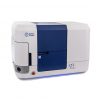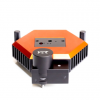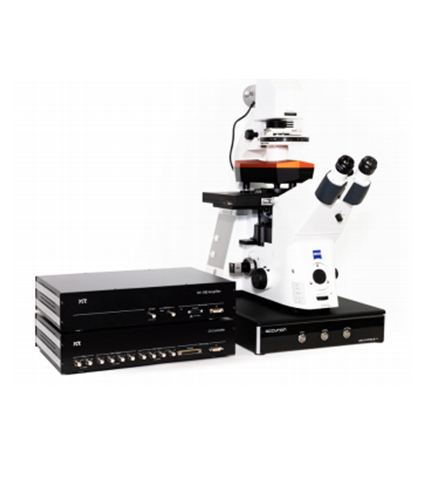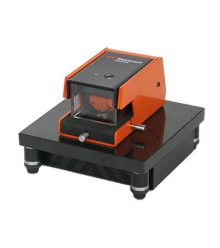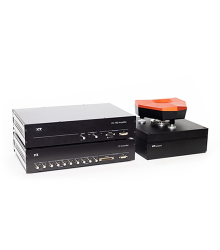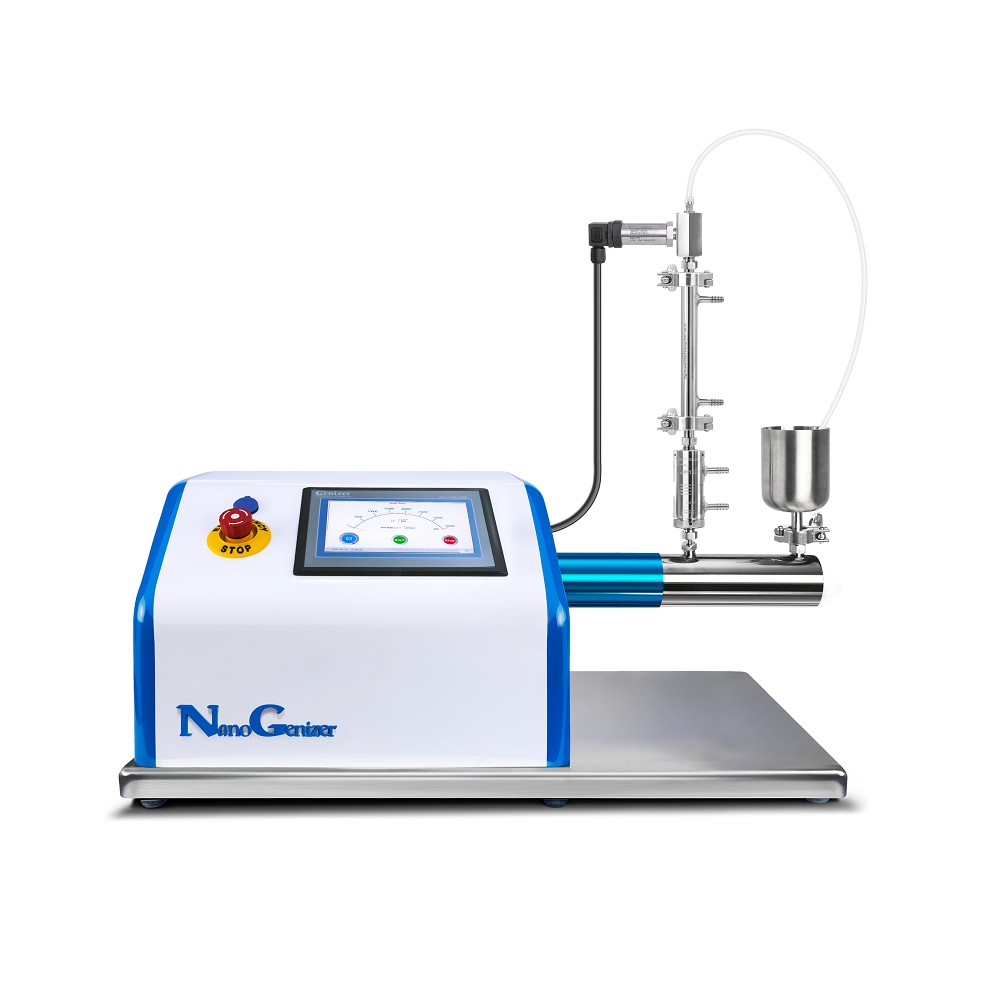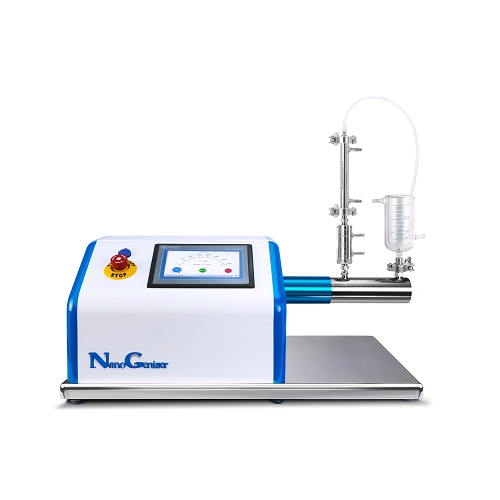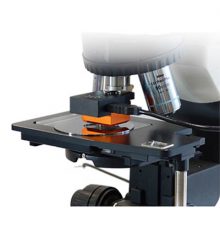Discount Products: Look through products available for a 25% – 50% discount in 2020. The items provided on a first come, first serve basis. View Discounted Products
Nanosurf DriveAFM inverted optical microscope setup
The DriveAFM, Nanosurf‘s new flagship instrument, utilizes the latest technology to deliver stable, high-end performance. It was designed to fulfill the needs of top notch research, today and in the future.
- CleanDrive: stable excitation in air and liquid
- Ultra low noise: below 15 fm/√Hz
- Direct drive: high-resolution imaging and large scan area
- Fully motorized system: full control via software
Introducing the Nanosurf DriveAFM inverted optical microscope setup
CleanDrive: stability in air and liquid with photothermal excitation
Photothermal excitation of the cantilever provides unparalleled stability, a linear frequency response, and a high excitation bandwidth in air and liquid environments. These benefits allow measurements at multiple frequencies and highspeed applications and open new horizons for innovative new measurement modes (e.g. Cytomass Monitor).
These advantages are amplified in liquids since only the cantilever beam is excited and the liquid environment remains largely unperturbed. This results in clean resonance peaks and not the “forest of peaks” commonly seen with the piezo acoustic excitation of cantilevers. Furthermore, this method of exciting the cantilever is insensitive to changes in the environment and distance to the sample, making the whole measurement system much more stable.
The DriveAFM, with its small light spots, is compatible with the use of small cantilevers, which have several advantages that make them superior in performance. While they have the same spring constant as a conventional cantilever, small cantilevers show a significantly higher resonance frequency and operational bandwidth. Also, the noise performance is better. Due to the small dimensions, the sensitivity is increased, and hydrodynamic drag is decreased. All of this results in better imaging performance.
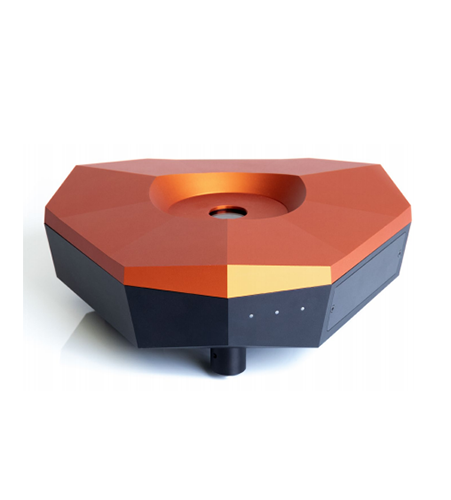
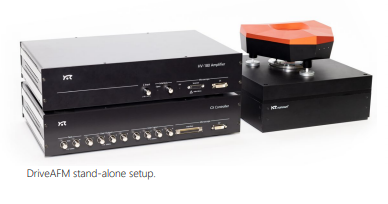
Key Features
Performance without compromise
The DriveAFM, Nanosurf‘s new flagship instrument, utilizes the latest technology to deliver stable, high-end performance. It was designed to fulfill the needs of top notch research, today and in the future.
- CleanDrive: stable excitation in air and liquid
- Ultra low noise: below 15 fm/√Hz
- Direct drive: high-resolution imaging and large scan area
- Fully motorized system: full control via software
Key Benefits
The DriveAFM combines performance and a wide range of applications important for material science research. Its unique direct drive tip scanner technology paired with CleanDrive are key for fast and stable operation in air and liquid. The tip scanner design makes the performance of the DriveAFM independent of the mass of the sample under investigation also allowing measurement on heavy samples. The full motorization not only simplifies working with the system but also facilitates automated measurements addressing different areas of a sample.
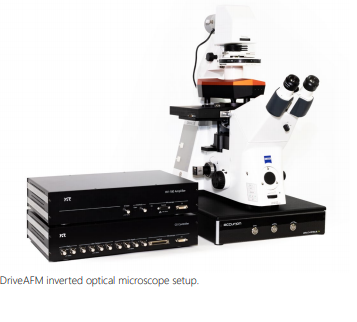
Trust the Experts at Spectra Research Corporation
Spectra Research Corporation (SRC) offers a range of innovative high-quality scientific products and laboratory services to industrial and scientific markets throughout Canada.
Specifications
The DriveAFM is a completely new high-end atomic force microscopy system. Its Nanosurf-typical ingenious design and the CX Controller, developed especially to maximise the potential of this scan head, yield the following specifications.
DriveAFM scan head specifications
| Scan size | typ. 100 µm x 100 µm x 20 µm min. 95 µm x 95 µm x 18 µm |
| Read-out light source | 850 nm low-coherence SLD |
| CleanDrive light source | 785 nm laser |
| Photodetector bandwidth | ≥8 MHz |
| Standard / maximum sample size | 100 mm / 150 mm |
| Z-height noise dynamic | <30 pm (RMS) |
| Z-height noise static | <30 pm (RMS) |
| DC detector noise* | <5 pm (RMS, 0.1 Hz – 1 kHz) |
| AC detector noise* | <25 fm/√Hz above 100 kHz |
| Approach | 10 mm motorized, parallel |
System functionality
| Standard imaging modes | Static force, dynamic force, phase contrast, MFM, friction force, force modulation, EFM |
| Advanced imaging modes (optional) | PFM, KPFM, 2nd lock-in amplifier, advanced dual pass, C-AFM |
| Imaging functions | Up to 8000×8000 data points X/Y sample slope correction |
| Standard spectroscopy modes | Force–distance, amplitude–distance, phase–distance |
| Spectroscopy functions | Setup wizard for each spectroscopy mode XY-position table: point, line, and grid |
| Standard lithography modes | Free vector objects drawing or real-time drawing by mouse Tip lift or force control during movement from point to point |
| Sample approach | Fast home, retract, and advance movement |
Datasheet


